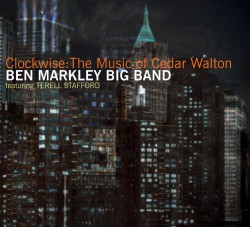MUSIC REVIEW BY Thomas Cunniffe, Jazz History Online
Ben Markley - a former contributor to these pages - writes in the liner notes to his new album "Clockwise: the Music of Cedar Walton" (OA2 22139) that "starting a big band was something I never thought was in the cards for me". Still, as director of Jazz Studies at the University of Wyoming, he is doubtlessly aware that big bands need fresh repertoire and more often than not, that music comes from small combo works. Markley's charts incorporate many of the standard tropes of big band writing—the large brass-driven tuttis, sax section variations, shout choruses, unique mixtures of instrumental colors - and makes Walton's compositions sound right at home in this expanded medium. For the most part, Markley retains Walton's original tempos and genres, and focuses on creative methods of voicing the lines and presenting countermelodies and solo backgrounds. To fill the ranks of the band, Markley has recruited some of the best free-lance musicians and jazz educators from Colorado and Wyoming, including trumpeters Pete Olstad and Greg Gisbert, trombonist Paul McKee, saxophonists Wil Swindler and Peter Sommer, guitarist Steve Kovalcheck, bassist Ken Walker and drummer Chris Smith. To this impressive crew, Markley added one amazing ringer: trumpeter Terell Stafford. Stafford leads off the solos on "Cedar's Blues" with a fine illustration of the development of trumpet styles between Clifford Brown and Freddie Hubbard; yet this is not just a history lesson from Stafford - he also performs the crucial role of soloing over a building ensemble background, adding to the overall excitement of the piece. Markley contributes a wide-ranging solo on "Hindsight", which includes a superb unaccompanied passage halfway through. McKee plays an inspired solo on "Fiesta Español" and Kovalcheck hits an authentic soul groove with his fills and solos on "I'm Not So Sure". Both Stafford and Sommer play outstanding solos on "Holy Land" - which makes it a highlight of the album - but I was particularly taken with their brief duo improvisation near the end of the track: both of these men have technique to spare but they know how to temper it to serve the music. This exceptionally well-played tribute is an important addition to the legacy of Cedar Walton.
Soundclips
Other Reviews of
"Clockwise: The Music of Cedar Walton":
New York City Jazz Record by Ken Dryden
Jazz Weekly by George W. Harris
Cadence by Robert Rusch
All About Jazz by Dan McClenaghan
DownBeat by Bobby Reed
Republic of Jazz by Domi
Midwest Record by Chris Spector
